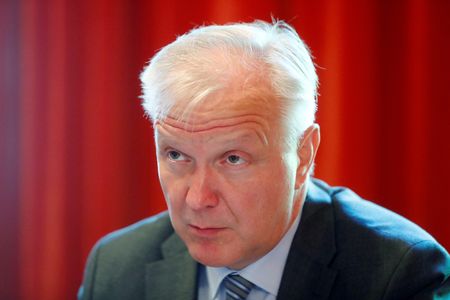 1
1 1
1

BERLIN (Reuters) – The drivers of inflation in the euro zone will subside over the course of the year and inflation will hover around the European Central Bank’s price stability target of 2% in the next two years, Finnish central bank chief Olli Rehn was quoted as saying on Sunday.
In a pre-released interview with German business daily Handelsblatt, Rehn said the future pace of normalization of the ECB’s loose monetary policy depended on the economic data.
“Personally, I expect the economic data to remain relatively good despite being affected by the Omicron variant,” Rehn said, adding he therefore viewed rate hikes in 2023 as a logical step, at least as long as there are no new economic shocks.
Rehn, who is also an ECB Governing Council member, pointed out that Germany’s nuclear phase-out at the end of the year would increase dependence on natural gas imports from Russia and bring more volatility to energy markets.
“The decisions about energy policy in Germany affect price fluctuations and thus the uncertainty about inflation,” Rehn said.
“For me, switching from coal to natural gas is not a green transition, and this transition phase will take a long time in Germany,” he added.
In the debate about the European Union’s fiscal rules, the head of the Finnish central bank backed calls for a reform to make the so-called Stability and Growth Pact more consistent, realistic and flexible at the same time.
“A debt limit of around 60 percent of gross domestic product, as prescribed by the previous regulation, is clearly unrealistic,” Rehn said, pointing to Italy’s debt-to-GDP ratio which is projected to be around 160% after the pandemic.
“If goals are unattainable, they will not achieve anything either,” Rehn said.
(Reporting by Michael Nienaber, Editing by Chris Reese)